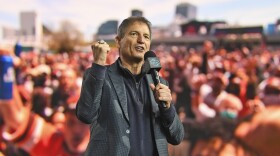Cleveland Browns great Jim Brown, who died last week at age 87, shattered records during a relatively short NFL career, leading the Browns to their last championship in 1964. In 1966, Brown retired in his prime at age 29 after nine years in the NFL.
“That would be like LeBron James, like almost retiring before he came (back) to Cleveland after he won those titles in Miami,” said Ideastream Public Media’s sports commentator Terry Pluto.
Pluto said while many believe Brown retired to pursue acting, his decision actually stemmed from a feud with then-owner Art Modell.
Pluto wrote about the saga in his 2003 book, “Browns Town 1964.”
“I remember interviewing Jim Brown and he said, ‘I'm very interested in Black power, but I'm even more interested in green power because green power will give you Black power.’ And by that, he meant the ability to carve out careers for yourself in different areas," Pluto said. "And he was the first African-American athlete to become a notable movie star.”
Brown began his acting career before the 1964 season, playing a buffalo soldier in a Western action film called “Rio Conchos.” Pluto said the turning point that ended Brown's football career came in early 1966, when Brown was shooting his second film in London, “The Dirty Dozen.”
Filming was taking longer than expected.
“Browns owner Art Modell is upset because Jim Brown is not in training camp. And Jim Brown says, ‘I've got to finish my movie, and then I'll come and play.’ Back and forth they went, a stalemate,” said Pluto.
Pluto said Modell then told Brown he would be fined $1,000 for every week that he wasn't in camp. That angered Brown, who said he hadn’t even signed a contract at that point.
“Back then, there was no free agency. So, you know, you were kind of stuck with the team you were with. And most of these guys just had year-to-year contracts,” Pluto said.
Modell also told Brown that missing training camp wasn’t fair to other players.
“I talked to several of the players on that team, and they said Jim Brown never missed a game. He never came out of a game unless a coach took him out of the game. He rarely missed a practice and he was so great at that point, if he wanted to finish his movie and show up right before the opener, that's fine with us," Pluto said. "Because, you know, this is a business for these guys. And back then, you know, if you won playoff games and won a championship, you can increase your salary by about 25 or 30%. And most of these guys had offseason jobs anyway.”
Pluto said that in mid-July of that year, Brown sent a letter to then-Cleveland Plain Dealer Sports Editor Hal Lebovitz, announcing his retirement. Lebovitz then broke the news in the paper.
“Brown did love football. But to him, this became a, I just think, a stance about pride. You know, ‘This guy's not going to tell me what to do. I earned the right to set myself up for a second career,’" Pluto said. "But, if you're a Browns fan back then, see, I'm old enough to have seen Jim play, and I'm old enough to remember when they won the title in 1964, they blew a shot at another title. That team thought they could win again.”
Eventually, Pluto said, Jim Brown and owner Art Modell made amends.
“Remember his comment about green power? Well, Art Modell for years had Jim Brown on his payroll, kind of being Jim Brown, of the Browns, and even after the team moved to Baltimore," Pluto said. "So, they buried all their problems. But if you were a Browns fan back in the middle sixties, you would just, look, say, 'You know, one or two more years of Jim Brown probably could have brought another title to Cleveland.'”







